
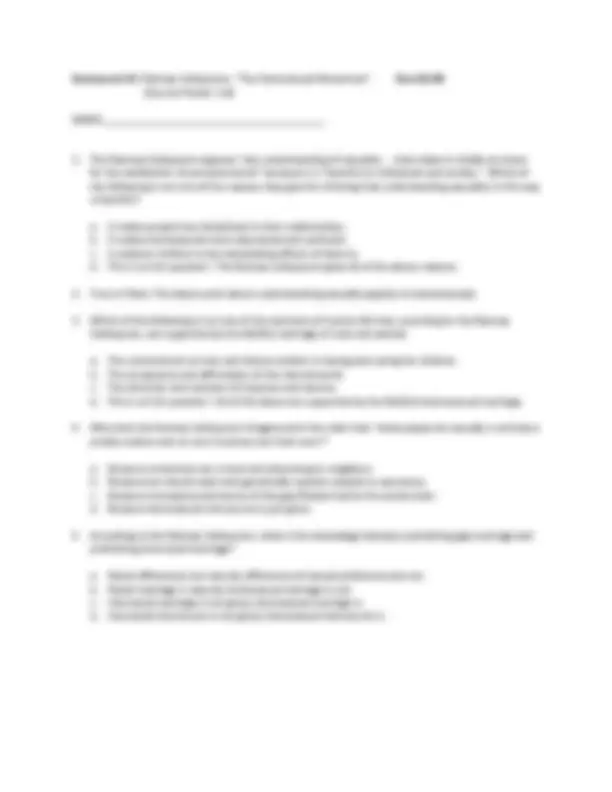
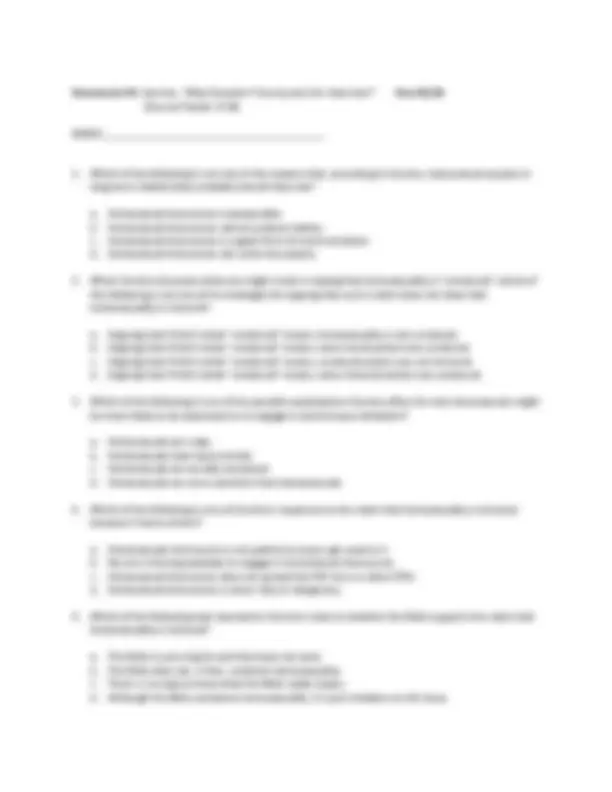
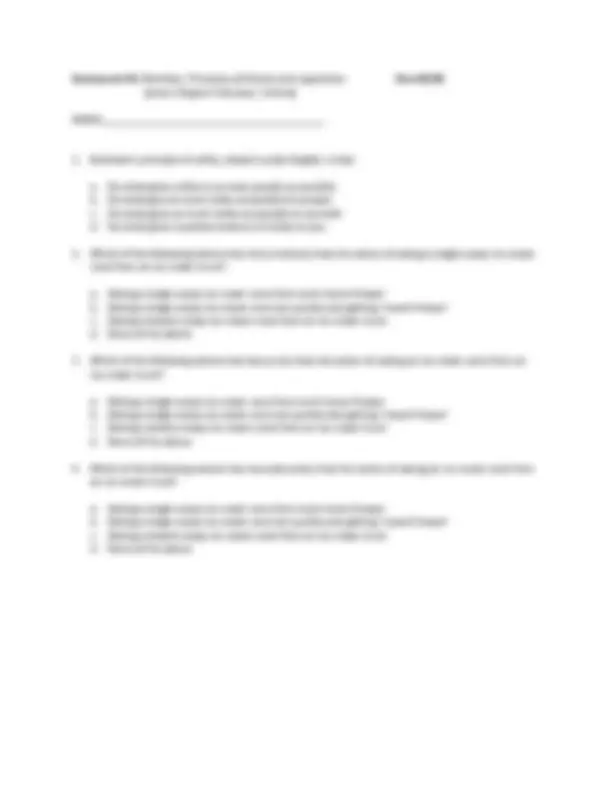
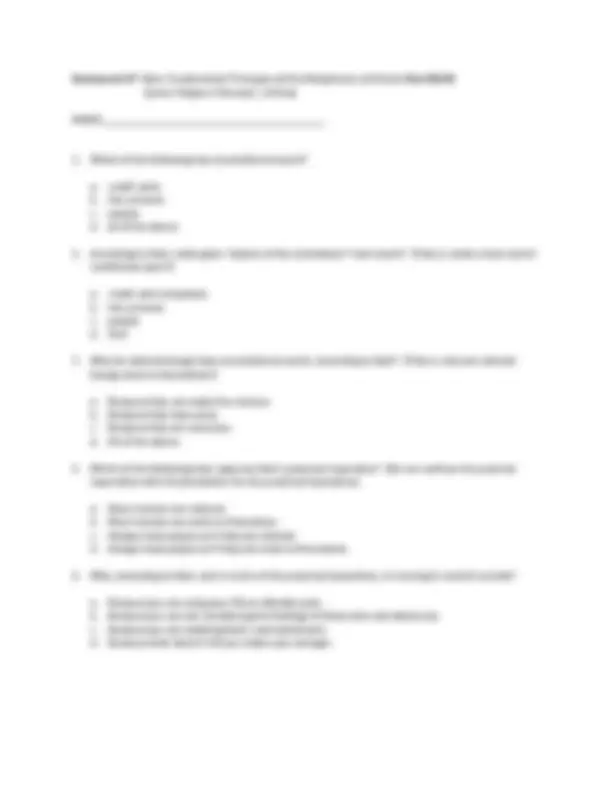

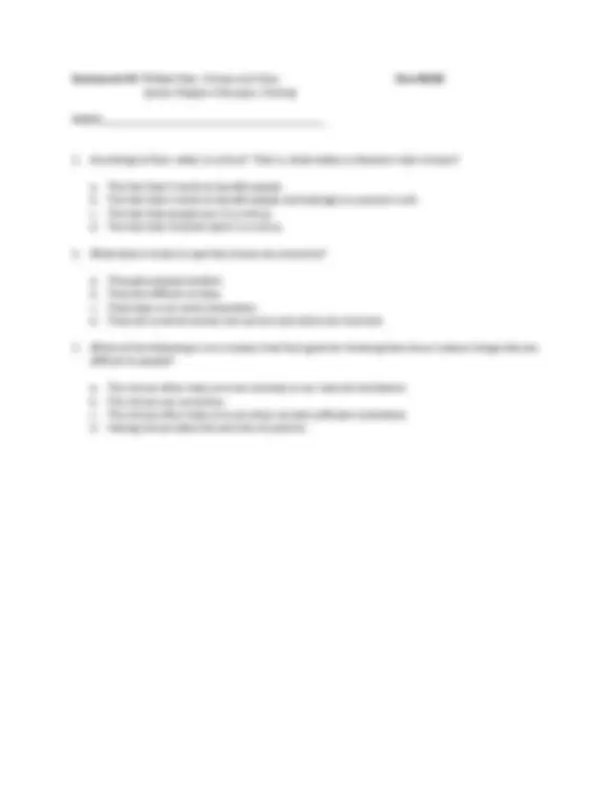


Study with the several resources on Docsity

Earn points by helping other students or get them with a premium plan


Prepare for your exams
Study with the several resources on Docsity

Earn points to download
Earn points by helping other students or get them with a premium plan
Community
Ask the community for help and clear up your study doubts
Discover the best universities in your country according to Docsity users
Free resources
Download our free guides on studying techniques, anxiety management strategies, and thesis advice from Docsity tutors
Material Type: Assignment; Professor: Jones; Class: PHL 202-04: Introduction to Ethics; Subject: Philosophy; University: University of Alabama - Huntsville; Term: Unknown 1989;
Typology: Assignments
1 / 11

This page cannot be seen from the preview
Don't miss anything!







Homework Assignment #1: Aquinas' "Of the Natural Law" Due 01/ (Jones Chapter 3 Excerpt / Online)
a. Whenever we perform an action, we do something that is good. b. Whenever we perform an action, we believe that we do something that is good. c. Whenever we perform an action, we try to attain something that is good. d. Whenever we perform an action, we believe that we attain something that is good.
a. Raise children b. Know about God c. Make wine d. Stay alive
Homework #3: Corvino, "Why Shouldn't Tommy and Jim Have Sex?" Due 01/ (Course Packet: 9-16)
a. Homosexual intercourse is pleasurable. b. Homosexual intercourse cannot produce babies. c. Homosexual intercourse is a good form of communication. d. Homosexual intercourse can unite two people.
a. Arguing that if that's what "unnatural" means, homosexuality is not unnatural. b. Arguing that if that's what "unnatural" means, some moral actions are unnatural. c. Arguing that if that's what "unnatural" means, unnatural actions are not immoral. d. Arguing that if that's what "unnatural" means, some immoral actions are unnatural.
a. Homosexuals are crazy. b. Homosexuals have loose morals. c. Homosexuals are socially ostracized. d. Homosexuals are more sensitive than heterosexuals.
a. Homosexuals intercourse is not painful once you get used to it. b. No one is forcing anybody to engage in homosexual intercourse. c. Homosexual intercourse does not spread the HIV virus or other STDs. d. Homosexual intercourse is never risky or dangerous.
a. The Bible is just a big lie and God does not exist. b. The Bible does not, in fact, condemn homosexuality. c. There is no way to know what the Bible really means. d. Although the Bible condemns homosexuality, it's just mistaken on this issue.
Homework #4: Bentham, Principles of Morals and Legislation Due 02/ (Jones Chapter 4 Excerpt / Online)
a. Do what gives utility to as many people as possible. b. Do what give as much utility as possible to people. c. Do what gives as much utility as possible to yourself. d. Do what gives a positive amount of utility to you.
a. Eating a single-scoop ice cream cone from one's home freezer b. Eating a single-scoop ice-cream cone too quickly and getting "mouth freeze" c. Eating a double-scoop ice cream cone from an ice cream truck d. None of the above
a. Eating a single-scoop ice cream cone from one's home freezer b. Eating a single-scoop ice-cream cone too quickly and getting "mouth freeze" c. Eating a double-scoop ice cream cone from an ice cream truck d. None of the above
a. Eating a single-scoop ice cream cone from one's home freezer b. Eating a single-scoop ice-cream cone too quickly and getting "mouth freeze" c. Eating a double-scoop ice cream cone from an ice cream truck d. None of the above
Homework #6: Kuper, "More than Charity" Due 02/ (Course Packet: 35-43)
a. Women and men have the same moral worth. b. Children and adults have the same moral worth. c. Americans and Taliban have the same moral worth. d. A cosmopolitan would believe all of the above.
a. Saving one is rewarding, but saving tens of thousands is just plain tiring. b. We get an emotional reward from saving one, but only an intellectual reward from saving thousands. c. Saving one requires a small sacrifice, but saving tens of thousands requires too much of a sacrifice. d. None of the above.
a. Sometimes it does harm to the poor. b. Sometimes buying luxuries is a better way to alleviate poverty than donating money. c. Sometimes giving money doesn't make a significant difference. d. All of the above are reasons Kuper gives.
Homework #7: Kant, Fundamental Principles of the Metaphysics of Morals Due 02/ (Jones Chapter 5 Excerpt / Online)
a. credit cards b. the universe c. people d. all of the above
a. credit card companies b. the universe c. people d. God
a. Because they can make free choices. b. Because they have souls. c. Because they are conscious. d. All of the above.
a. Most humans are rational. b. Most humans are ends-in-themselves. c. Always treat people as if they are rational. d. Always treat people as if they are ends-in-themselves.
a. Because you are using your life to alleviate pain. b. Because you are not considering the feelings of those who care about you. c. Because you are violating God's commandments. d. Because what doesn't kill you makes you stronger.
Homework #9: Phillipa Foot, Virtues and Vices Due 04/ (Jones Chapter 6 Excerpt / Online)
a. The fact that it tends to benefit people. b. The fact that it tends to benefit people and belongs to a person's will. c. The fact that people say it is a virtue. d. The fact that Aristotle said it is a virtue.
a. They give people wisdom. b. They are difficult to have. c. They help us to resist temptation. d. They tell us which actions are correct and which are incorrect.
a. The virtues often help us to act contrary to our natural inclinations. b. The virtues are corrective. c. The virtues often help us to act when we lack sufficient motivation. d. Having virtues takes lots and lots of practice.
Homework #10: No Reading Due 04/ (Jones Chapter 7 / Online)
Answer two parts of Question #1 and the entirety of Question #2.
b. What is the main attractive feature of utilitarianism and the main drawback?
c. What is the main attractive feature of deontology and the main drawback?
d. What is the main attractive feature of virtue ethics and the main drawback?
(Nota Bene: I will not return this homework assignment to you unless you specifically request that I do so. This is because I'd like to keep your responses as a research aid in further developing Chapter 7.)